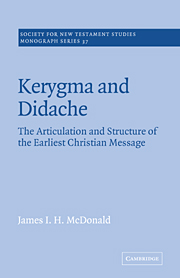1 - Propheteia
Published online by Cambridge University Press: 06 November 2009
Summary
Surely the Lord God does nothing,
without revealing his secret
to his servants the prophets.
The lion has roared;
who will not fear?
The Lord God has spoken;
who can but prophesy?
(Amos 3: 7f.)The phenomenon of prophecy
To study the fascinating variety and richness of the prophetic traditions - from Zoroaster, the archetypal prophet of the Iranian tradition, to Muhammad, the Prophet of Islam, and from the Hebrew nabV to the oracle prophets of Delphi or Dodona - would involve a lengthy digression at this point. Let it suffice to note that the precise meaning of the term ‘prophet’ is determined by the context and tradition in which it operates. No two prophetic traditions were more unlike than those of Greece and Israel, yet some degree of linguistic compatibility was eventually arrived at. When Alexander had effected the marriage of East and West, and Hellenism had invaded the jealously guarded precincts of Judaism, the question of the appropriateness of the Greek word prophētēs as a translation of nabi′was settled by the practice of the translators of the Septuagint, who made precisely this identification. No doubt they found the flexibility of the Greek term something of an asset.
Whatever cultural cross-fertilisation took place at certain points, the basic forms of Christian propheteia inevitably derived in the main from the prophetic tradition of Israel.
- Type
- Chapter
- Information
- Kerygma and DidacheThe Articulation and Structure of the Earliest Christian Message, pp. 12 - 38Publisher: Cambridge University PressPrint publication year: 1980

